Monthly Archives: October 2018
Interview with Jim Woods
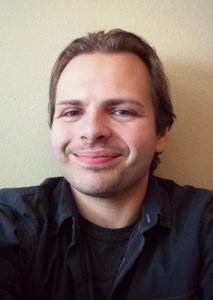
In 2012, I had the pleasure of connecting with Jim Woods on Twitter and then meeting him in person at Jon Acuff‘s Quitter Conference held in Nashville. Jim was so kind, encouraging and gracious toward me. I’ve witnessed his growth as a writer and I am honored to be interviewing him.
*************
1) When did you know you wanted to be a writer?
I think it was when I wrote a report in the fourth grade. I was really into nature and I wrote about snakes. I realized how much fun it could be to do research and then telling a story about my findings.
2) How did you develop the confidence to find your voice as a writer?
I think it was more through practice and trial and error. That being said, writing how you talk is always a great place to start.
3) Were there any books you read that helped shape and mold you as a writer?
Absolutely! I love Steven Pressfield‘s Do The Work and War of Art. Also, I have a lot of fiction influences: Edgar Allen Poe, Elmore Leonard and J.D. Salinger.
3) What did you do before you transitioned into being a full-time writer?
I was an accountant for over 15 years. That’s hard to believe now!
4) How long did the process take? What steps did you take in making your dream a reality?
About three years. It was a long long three years. Writing as much as possible, networking, going to conferences, meeting as many people for coffee as possible.
5) Now that you have succeeded, what is it like being on the other side of the rainbow? Has it been anything like you had imagined?
It’s like a good struggle, like when you’re tired after working really hard. You’re exhausted, but at the same time very satisfied.
To answer your other question, it’s harder than I thought it would be. It can be hard to unplug from the work.
6) What does your writing process look like?
I like to watch my work as much as possible. I am a momentum-based emotional writer so I like to find some easy wins and then go from there.
7) What is the hardest thing about being a full-time writer?
It’s pretty lonely and rejection comes with the territory.
8) How do you encourage yourself to keep going?
I talk to other writers and learn from them. Whatever the circumstance, it is very likely that someone else can relate.
9) Where do you see yourself in the next five years?
I just want to work with good people and keep telling good stories.
10) Are you working on any new projects?
About a month ago I created an event called the Finish Your Book Summit where I interviewed 16 authors who have written over 100 books. It’s still live, so you can access the interviews by going to finishyourbooksummit.com.
11) What advice would you give to someone starting out?
Don’t be afraid to start out slowly. Build a good writing habit—even if it is just for 5 minutes a day. Over time you’ll build momentum and see serious results!
Thank you for a wonderful interview, Jim.
*************
Jim Woods is a freelance writer, author, author assistant, and writing coach that loves to help others tell better stories. You can connect with him at jimwoodswrites.com.
Interview with Andi Cumbo-Floyd
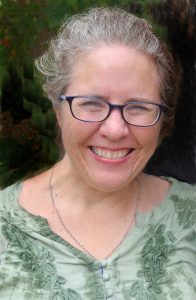
Once again, I am excited to be interviewing one of my mentors, Andi Cumbo-Floyd. It’s been five years since I’ve last interviewed her. I first connected with Andi on Twitter in 2012, and have had the pleasure of following her ever since. She is an amazing writer, editor, coach and much more. If you have not read her blog posts or any of her books, I would highly recommend that you do.
********
1) What are the things you wished you had known when you were finding your way as a writer?
I wish I had known that the better part of a writer’s life is about discipline and perseverance and much less about talent or inspiration or affirmation. I wish I had known that showing up at the page and doing the work would be reward in and of itself and that avoiding that work would weigh far more heavily than the weight of actually doing it.
2) Could you describe your writing process?
Sure. On the days when mothering and editing allow me time to write, I sit down with a book of poetry and a journal. I read one or two poems, and I watch for the line that most stands out to me for whatever reason. Then, I copy over that line into my journal and start writing with that line. Sometimes I write about what the line brings up, and sometimes, I begin working on my work in progress. Either way, these few handwritten pages help me drop into the place of creativity and leave the rest of my world behind for a bit.
Then, I transition over to the computer and write 1,000 words on my work in progress.
3) Has becoming a mother changed the way you write?
The most obvious change is that I have far less time to futz around before getting to work. Since I am my son’s primary caregiver and since I also work full-time, I have to get right down to work when I have time to do the writing, which isn’t every day anymore.
But it’s also made me a little less precious with my words, a little less willing to stay on the surface. I go deep and quickly. Sometimes that means my writing is more raw. Sometimes, it means it takes me more time to find what I really need to say.
4) What is “voice” and how do you develop it? How did you find yours?
Voice is, as I see it, just a fancy way of saying the way a writer sounds on the page. It’s a combination of the way a writer says things – sentence structure, vocabulary, dialect – and also what they say about what topics. I found mine – as I think all writers do – through practice. I wrote, read what I wrote (often out loud), and felt what read as most genuine to who I am. Then, I just kept practicing until more of what I wrote sounded like more of me.
5) How does a writer arrive at knowing what they should write (i.e., non-fiction, fiction) and what genre?
I don’t like the word “should” about most things in life, but particularly about writing. There is no “should” about what a writer writes. It’s all about preference and about what we have to say about things. But there is nothing that any one person should or should not write. There’s only what we want – maybe sometimes need – to write.
6) In your experience, what is the most important aspect in becoming a professional writer?
Discipline and perseverance. Doing the work. That’s it.
7) I find most great authors, which includes you, hold Master’s degrees. Do you believe a writer needs a Bachelor’s and Master’s degree to succeed in writing good stories? If not, why do most great authors go through the process of a college education? What do you believe is the key to becoming a successful writer or author when someone doesn’t have a college degree?
Thanks, Pilar. I got a degree in writing because I needed a credential to teach writing, and I got that credential. . . but more, I learned discipline and to write to a deadline. I learned about critique and writing regularly. I learned how to give and receive criticism. I learned some things about craft, too. But none of those things require a degree. Anyone can learn all of them through writing groups or online communities, through partnerships with other writers, or through a solid, self-imposed discipline toward writing.
And I would say that I don’t know that most authors do get a degree, at least not a degree in writing. Some of us do, but many, many writers I know have no college degree in writing and almost none have graduate degrees in writing. I know a writer who has a chemistry degree and another who works by day as a software developer. A degree isn’t necessary at all. It’s just a construct that helps us learn discipline and some of the tools in a concentrated way.
8) When you mentor and encourage others to write a thousand pages a day, what does that look like? Does journaling count? Or does the writing have to be something specific like working on a short story, novel or memoir?
A 1,000 words a day. (Not a thousand pages. 🙂 ) Shawn Smucker suggested I try that, and it works well for me. For me, 1,000 words is pretty much all I have time for these days. So sometimes those words go toward a blog post, sometimes toward an interview like this one, sometimes toward my work in progress. Billy Coffey suggested that – the discipline of writing 1,000 words of anything a day is key, not necessarily what you write.
9) Do you consider listening to audiobooks reading? Do you believe there is a difference between reading physical books versus electronic or audiobooks for a writer?
I do think listening to audiobooks is reading, a different form of reading but reading nonetheless. The difference is in how we take in the story, but both are really valid ways of accessing stories. In audio, we listen to the way the sentences move on the page, to the trip of language, and while we do some of that when we read on the page, we are also more focused on the visual layout – paragraph length, the shape of the words visually (or via touch if we read in Braille.) Neither is better or worse. They are just different ways of spending time with story.
10) You are an author, blogger, vlogger, editor, farmer, mother, etc. You have successfully achieved and attained so much in your life. What’s next? What are your goals now?
I have been given a lot of gifts in life, and one of my main goals is to steward them well. So that means making my family a priority in a new way now that Milo is with us. But it also means figuring out how to do that and still be responsible to my clients and readers . . . and to myself. I would not be a healthy person if I didn’t write, so one of my main goals is to figure out how to mother and still write.
11) I finished reading your latest book, Love Letters To Writers, and I am now reading Discover Your Writing Self. Both books are wonderful and encouraging. Are you working on anything new?
I am, but I’m not talking about it publicly yet. I’ve found that I need to let my books have some silence around them, especially at the beginning, so I’ll be saying more about that around my spaces in the coming months.
12) What do you enjoy writing more fiction or nonfiction and why?
Oh, I enjoy both, but my heartbeat is in creative nonfiction. There’s just something about wrapping words around an experience or bit of history that gives me energy and flexes my mental and creative muscles. I love that.
Thank you for a great interview, Andi.
********
Andi is a writer, editor, and farmer who lives at the edge of Virginia’s Blue Ridge Mountains with her husband and son, four dogs, three cats, six goats, and thirty-two chickens. She writes regularly about the writing life at andilit.com. You can find her on Facebook, Twitter, Instagram, Pinterest, LinkedIn and Goodreads.
Blind Spots
One of the biggest challenges for Christians is the ability to see themselves. It reminds me of the blind spots while driving.

Blind Spot by Nimish Gogri | Creative Commons
Blind spots are areas of the road (or vehicles) that cannot be seen while looking forward or through either the rear-view or side mirrors.
What do I mean by blind spots in our Christian walks?
Here are some examples:
Example 1: A father who has been a Christian for many years, graduated Bible school, did missionary work and is a worship leader. He is known to drop everything to do “ministry.” Yet, when his son was down and out, lost his license and vehicle due to a DWI and needed a ride to work, his father told him that he couldn’t give him a ride because it was too much for him.
Example 2: A woman receives a negative health diagnosis and is waiting to have a procedure done. She is alone and anxious. She decides to text a sister in Christ and ask for prayer. She never responds. The following day she texts her again to ask if she had received her text. She responds by saying yes, but that she didn’t have anything to say.
Example 3: A son gets kicked out from where he was living. For all practical purposes, he is homeless. He reaches out to his father and asks if he could stay with him temporarily until he can get himself together. His father says, No.
All three people are believers, who are either doing ministry or serving the Lord. However, when the rubber meets the curve (I’m trying not to use cliches, lol), their words and actions are incongruent. There is a disconnect.
This is what I refer to as blind spots and what others call hypocrisy.
Blind spots are deceptive, dangerous, and destructive. We all need to face the truth about our blind spots. They need to be dealt with, and not ignored, denied, justified, deflected and excused.
How do we face our blind spots?
- By accepting that we have them.
- By praying, repenting and asking God for awareness, assistance and forgiveness.
- By reading and studying the Bible daily, which helps in examining (2 Corinthians 13:5), and judging ourselves. (1 Corinthians 11:31).
Thank the Lord for your truth, love, forgiveness, mercy and grace.
“Amazing Grace, How sweet the sound
That saved a wretch like me
I once was lost, but now am found
T’was blind but now I see”
#MeToo
I wasn’t going to write this, I really wasn’t. But, the thoughts kept nagging at me, to the point that I couldn’t sleep. My writing friend and mentor Andi says that when this happens you must write the story that gnaws to be told.
This is going to be difficult for me to write for various reasons. Mostly, because my story will not coincide with many in the #MeToo movement.
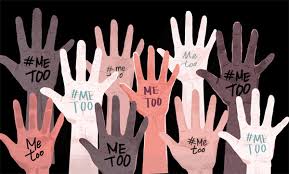
The purpose of a writer is to tell the truth and that’s what I am going to attempt to do. For better or for worse.
Around this time in 1983, I was raped by my boyfriend. I was 16 going on 17. I remember it like if it happened yesterday. It changed the trajectory of my life. I was never the same. A part of me died. I fell into a deep depression, was suicidal and started to drink a lot to cope with feelings I didn’t understand.
I was naive as I didn’t even know that what had happened to me at 16 was rape until 10 years later while I was in therapy.
Now that I have told the whole world (I’m exaggerating), I feel so much better now (I’m joking). Actually, telling you or the whole world will not make an ounce of difference nor will it ever change what happened to me.
I am not minimizing any woman’s experience and their needing to come out and speak up about their violation.
There have been several stories I have followed: Dr. Larry Nassar, Bill Cosby, Harry Weinstein, Corey Feldman, and Kevin Spacey.
I was especially touched by Rachael Denhollander’s moving statement.
However, I’m not Rachael or any of these Hollywood celebrities coming out in protest against something that unfortunately happens all the time, especially in high school. Again, I am not minimizing or dismissing their or my experience. I am just stating a fact.
There are various reasons for rape which doesn’t make any of it right, but it does happen. Young boys who are under the influence and go too far. They don’t exhibit the proper self-control. I’m not saying every incident of rape is like this. But, a boy’s raging hormones mixed with alcohol is a dangerous combination. Young boys already struggle with self-control and if there is no male figure in their life to teach them, well, a whole bunch of stupid things can happen at that age, which includes rape.
My coming out and speaking the truth about my experience does nothing to change it. The two men who raped me (yes, unfortunately there was a second time by another “boyfriend”) are six feet under. I can’t go back and undo what happened to me. Even if they were alive and I was able to press charges against them (which I didn’t and wouldn’t), punishing them wouldn’t do anything to change what happened and the damage it caused.
In my case, it doesn’t matter. I am a nobody. I have no influence. I am no one of importance in the big scheme of things. My #MeToo story doesn’t matter and won’t change a single thing.
My point is who cares if I was raped. What difference is it going to make if I told my story? How is my experience actually going to revolutionize some else’s life?
However, for people like Rachael and others, it does matter. Especially given their abusers are serial rapists. Unfortunately, sexual predators will continue to victimize and sexually abuse until they are caught and stopped. It’s an illness. Nowadays, they define help as prison time, which I don’t wholly agree with. But, that’s different topic for another day.
I don’t mean to come across as cold or callous. I have been in rooms with others who were sexually abused much worse than I ever was which made my experiences look petty and insignificant. We all talked and cried until we were blue in the face, and it did nothing to change what happened to us.
Yes, rape is wrong. No one should ever be sexually violated. Yes, it was bad. We were young and innocent. However, there comes a point where we can’t focus or linger on what happened to us.
The pain of our pasts can only be healed by the One who created us, and it comes through forgiveness.
This is why I admire and respect Rachael Denhollander. She did not come across as angry, vengeful and with something to prove. She was peaceful, you could see it in her demeanor and countenance. The peace she possesses comes from her faith in Jesus Christ. She forgave Dr. Larry Nassar. That’s huge.
My healing did not come by fighting or speaking up about my experience or lashing out at men because I was raped. There was a time when I was angry. However, my anger didn’t dissipate by talking about my experience, it came by drawing close to Jesus and through forgiveness. Forgiving them and myself.
I am sure many reading this will think I sound trite and religious. After many years of suffering and not getting answers no matter how many rooms I sat in or how many hours of therapy I had or how many journals I’ve filled, I realized the answer to my pain and suffering was surrender and forgiveness.
The complete opposite of what this world will tell you. This world’s philosophy is to fight back, and shake our fists at whomever goes against what we think or believe.
There are times when justice needs to be served, and God will allow it. Not always though. When all is said and done, as believers, earth is not our home. The ultimate justice will be served when we stand before Jesus Christ and give an account for everything we have said and done.
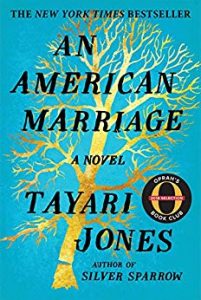 Publisher:
Publisher: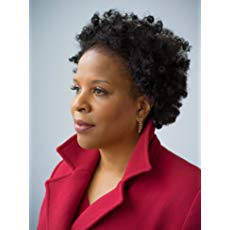 Tayari Jones
Tayari Jones